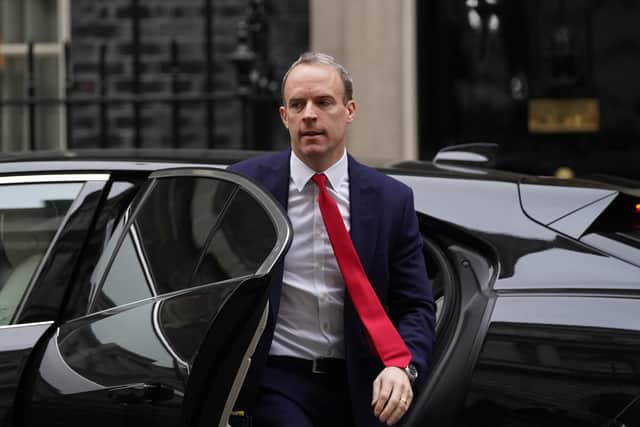Tory reform of Human Rights Act an 'ideologically motivated attack freedoms' say Scottish and Welsh governments
This article contains affiliate links. We may earn a small commission on items purchased through this article, but that does not affect our editorial judgement.
In a joint statement, equalities and social justice ministers in both governments attacked the plans as an “ideologically motivated attack” on freedoms currently protected under the Act.
The comments follow recent meetings between ministers and Deputy Prime Minister and justice secretary Dominic Raab in Edinburgh and Cardiff.
Advertisement
Hide AdAdvertisement
Hide Ad

The proposals to prevent “abuses of the system” were unveiled by Mr Raab in the Commons in December. The justice secretary said the changes would allow the UK Government to deport more foreign criminals.
It would also allow judges to block what the Government labelled “spurious” challenges to deportation orders on the basis of the right to a family life from making it to court.
The plans prompted a backlash from campaigners, whom say they are a “threat to how and when we can challenge those in power”, warning the rights of “ordinary people” could be “fatally weakened” by the changes.
Mr Raab said the reforms would strengthen “typically British rights” and add a “healthy dose of common sense” to the interpretation of legislation and rulings.
However, minister for equalities Christina McKelvie and the Welsh minister for social justice, Jane Hutt, and Welsh minister for the constitution, Mick Antoniw, set out their opposition to the plans, labelling them “unwelcome and unnecessary”.
They said: “We have grave and deep-seated concerns in relation to both the current proposals and the UK Government’s longer-term direction of travel.
“The Human Rights Act plays a critically important role in protecting fundamental human rights across the whole of the United Kingdom. For more than two decades it has benefitted individual members of society and ensured public institutions respect, protect and fulfil human rights.”
The ministers said the Act has allowed for action on women’s equality, to the protection of free speech and the right to protest.
Advertisement
Hide AdAdvertisement
Hide AdPart of Mr Raab’s plans include reinforcing the weight given to the right to freedom of speech, stating it does “sometimes mean the freedom to say things which others may not wish to hear”.
The devolved ministers said the Act was also central in the fight for justice around Hillsborough, and that it was “sobering” to consider how a “weakened” Human Rights Act could have “led to the deportation of yet more members of the Windrush generation”.
The statement continues: “The Independent Human Rights Act Review concluded there was no good case for making significant changes to the Act as it currently exists based on the extensive evidence it received from some of the United Kingdom’s most eminent legal experts.
"Disregarding that weight of evidence and expertise to press ahead with plans can only be interpreted as an ideologically motivated attack on the freedoms and liberties protected by the Human Rights Act.
“The proposals for a ‘modern Bill of Rights’ are both unwelcome and unnecessary. We are very clear that the interests of people in Scotland and Wales are best protected by retaining the Human Rights Act in its current form.”
The plans from the Department of Justice are subject to a three-month consultation, set to end mid this month.
Mr Raab said in a statement: “These assertions are irresponsible scaremongering. Our plans retain the European Convention on Human Rights, and will reinforce essential rights, including freedom of expression.
"Our reforms will also, however, curb abuses of the system and add a healthy dose of common sense, including making it easier to deport foreign criminals – which is in the interests of everyone across the United Kingdom.”
Want to hear more from The Scotsman's politics team? Check out the latest episode of our political podcast, The Steamie.
It's available wherever you get your podcasts, including Apple Podcasts and Spotify.
A message from the Editor:
Thank you for reading this article. We're more reliant on your support than ever as the shift in consumer habits brought about by coronavirus impacts our advertisers.
If you haven't already, please consider supporting our trusted, fact-checked journalism by taking out a digital subscription.
Comments
Want to join the conversation? Please or to comment on this article.
